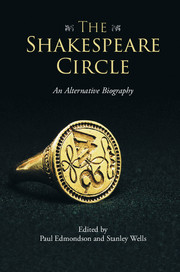Book contents
- Frontmatter
- Contents
- List of illustrations
- List of contributors
- Preface and acknowledgements
- General introduction
- Part I Family
- Part II Friends and Neighbours
- 12 A close family connection: the Combes
- 13 Schoolfriend, publisher and printer Richard Field
- 14 Living with the Mountjoys
- 15 Ben Jonson
- 16 Richard Barnfield, John Weever, William Basse and other encomiasts
- 17 Last things: Shakespeare's neighbours and beneficiaries
- Part III Colleagues and Patrons
- Closing remarks
- Afterword
- Index
- References
13 - Schoolfriend, publisher and printer Richard Field
from Part II - Friends and Neighbours
Published online by Cambridge University Press: 05 November 2015
- Frontmatter
- Contents
- List of illustrations
- List of contributors
- Preface and acknowledgements
- General introduction
- Part I Family
- Part II Friends and Neighbours
- 12 A close family connection: the Combes
- 13 Schoolfriend, publisher and printer Richard Field
- 14 Living with the Mountjoys
- 15 Ben Jonson
- 16 Richard Barnfield, John Weever, William Basse and other encomiasts
- 17 Last things: Shakespeare's neighbours and beneficiaries
- Part III Colleagues and Patrons
- Closing remarks
- Afterword
- Index
- References
Summary
1
Near the beginning of The Two Gentlemen of Verona, a couple of elders consider a son's future. It's recently been observed that ‘Home-keeping youth have ever homely wits’ (1.1.2). Now, having heard ‘sad talk’ from Antonio's brother on the subject of his nephew, Proteus, the servant Panthino reports to this master what he's heard:
He wondered that your lordship
Would suffer [Proteus] to spend his youth at home
While other men, of slender reputation,
Put forth their sons to seek preferment out –
Some to the wars to try their fortune there;
Some to discover islands far away;
Some to the studious universities;
For any or for all these exercises
He said that Proteus your son was meet.
(1.3.4–12)The uncle's complaint is that ‘living dully … at home’ doesn't just ‘sluggardize’ (1.1.7) a young man's ‘wits’; it stores up ‘great impeachment to his age / In having known no travel in his youth’ (1.3.15–16).
This conversation, or a version of it, must have been the constant chatter up and down England in Shakespeare's youth, as fathers, not only ‘elites’ (like Antonio) but tradesmen, like John Shakespeare, aimed to secure employment for their sons to set them up for life. Given his evident ambitions for his son, it was surely a conversation Henry Field, a man of very ‘slender reputation’, had, and perhaps with John Shakespeare. They were near enough neighbours in the market town of Stratford-upon-Avon, the Shakespeares living at the Rother Market end of Henley Street, the Fields, down towards the river along Bridge Street; their houses three minutes walk from each other. They worked in parallel trades, Field a tanner, employed in the heavy leather industry that dealt in cattle hides, an insalubrious process that required hides to be soaked in an infusion of bird droppings and dog dung or stale beer and urine then layered and steeped in a pit for a year in an oak bark solution, while Shakespeare was employed at the lighter end of the trade, a whittawer. Tawing sheep and goat hides with alum and oil, he was preparing skins for use in his main business, the highly skilled craft of glove making (Cherry 1991, p. 295).
- Type
- Chapter
- Information
- The Shakespeare CircleAn Alternative Biography, pp. 161 - 173Publisher: Cambridge University PressPrint publication year: 2015
References
- 1
- Cited by

